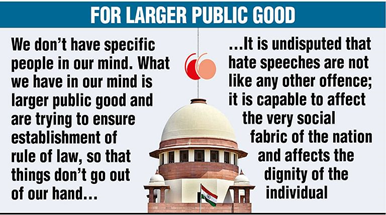

29th April 2023 (5 Topics)
Context
Calling hate speech a serious offence that can affect the secular fabric of India, the Supreme Court directed all states to suo moto register cases of such offences even if there is no formal complaint.
Key highlights of the SC Order
- Any hesitation to act will be viewed as contempt of the top court and appropriate action will be taken against the erring officers.
- All states and UTs shall ensure that immediately as and when any speech or any action takes place which attracts offences such as Sections 153A, 153B and 295A and 505 of the IPC, suo motu action will be taken to register cases even if no complaint is forthcoming and proceed against the offenders in accordance with law.
What comes under hate speech?
- There is no international legal definition of hate speech, and the notion of what constitutes "hateful" speech is debatable.
- Hate speech is defined as any form of communication, whether spoken, written, or physical, that criticizes or discriminates against a person or a group based on their religion, ethnicity, nationality, race, colour, descent, gender, or other identity factors.
Legal Provisions of Hate Speech in India:
- Article 21: Responsible speech is the essence of the liberty granted under Article 21 of the Constitution.
- Article 19(2): It guarantees freedom of speech and expression to all citizens of India.
- Exception: Hate speech has not been defined in any law in India. However, legal provisions in certain legislations prohibit select forms of speech as an exception to freedom of speech.
|
Legislations around Hate speech: The Indian Penal Code, 1860 (hereinafter IPC);
|


